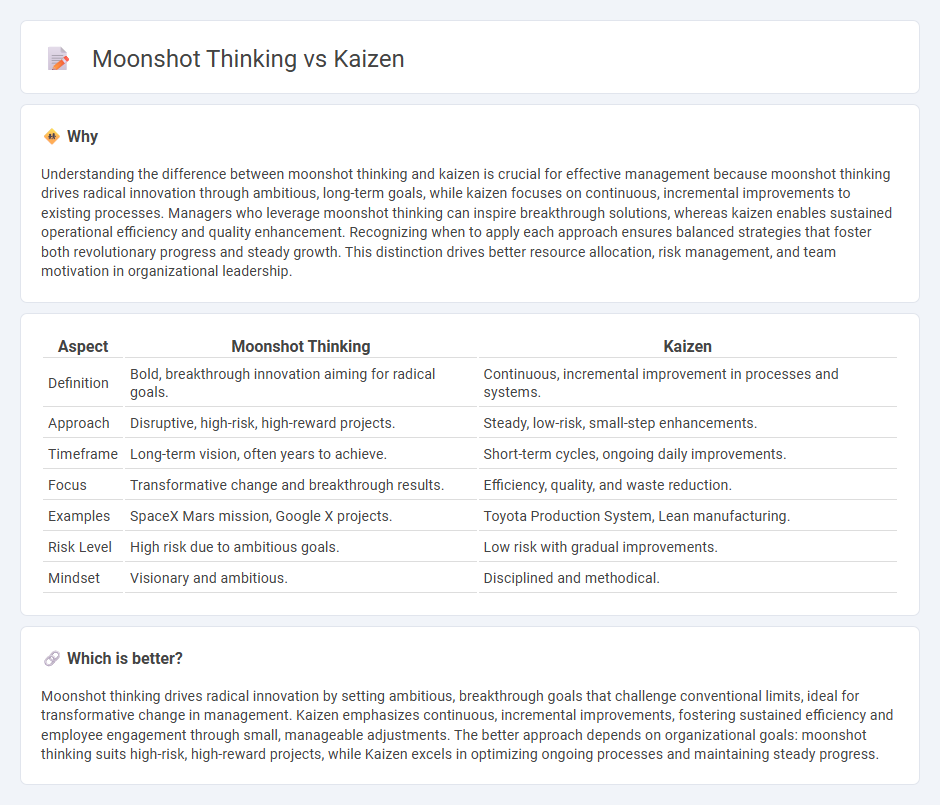
Management strategies like moonshot thinking emphasize radical innovation and breakthrough goals to achieve transformative growth. Kaizen focuses on continuous, incremental improvements that enhance efficiency and sustain long-term progress. Explore the nuances between these methodologies to optimize leadership and organizational success.
Why it is important
Understanding the difference between moonshot thinking and kaizen is crucial for effective management because moonshot thinking drives radical innovation through ambitious, long-term goals, while kaizen focuses on continuous, incremental improvements to existing processes. Managers who leverage moonshot thinking can inspire breakthrough solutions, whereas kaizen enables sustained operational efficiency and quality enhancement. Recognizing when to apply each approach ensures balanced strategies that foster both revolutionary progress and steady growth. This distinction drives better resource allocation, risk management, and team motivation in organizational leadership.
Comparison Table
| Aspect | Moonshot Thinking | Kaizen |
|---|---|---|
| Definition | Bold, breakthrough innovation aiming for radical goals. | Continuous, incremental improvement in processes and systems. |
| Approach | Disruptive, high-risk, high-reward projects. | Steady, low-risk, small-step enhancements. |
| Timeframe | Long-term vision, often years to achieve. | Short-term cycles, ongoing daily improvements. |
| Focus | Transformative change and breakthrough results. | Efficiency, quality, and waste reduction. |
| Examples | SpaceX Mars mission, Google X projects. | Toyota Production System, Lean manufacturing. |
| Risk Level | High risk due to ambitious goals. | Low risk with gradual improvements. |
| Mindset | Visionary and ambitious. | Disciplined and methodical. |
Which is better?
Moonshot thinking drives radical innovation by setting ambitious, breakthrough goals that challenge conventional limits, ideal for transformative change in management. Kaizen emphasizes continuous, incremental improvements, fostering sustained efficiency and employee engagement through small, manageable adjustments. The better approach depends on organizational goals: moonshot thinking suits high-risk, high-reward projects, while Kaizen excels in optimizing ongoing processes and maintaining steady progress.
Connection
Moonshot thinking drives radical innovation by setting ambitious, groundbreaking goals, while Kaizen focuses on continuous, incremental improvements. Both methodologies complement each other in management by blending visionary breakthroughs with sustained optimization processes. Implementing moonshot projects alongside Kaizen principles fosters a balanced strategy for long-term organizational growth and adaptability.
Key Terms
Continuous Improvement
Kaizen emphasizes gradual, continuous improvement through small, incremental changes that enhance efficiency and quality over time. Moonshot thinking targets radical innovation by aiming for breakthrough solutions and transformative goals that often require significant risk and disruption. Explore deeper insights to understand how combining both strategies can optimize business growth and innovation.
Disruptive Innovation
Kaizen emphasizes continuous, incremental improvements that enhance existing processes and products, fostering steady growth within established markets. Moonshot thinking targets disruptive innovation by pursuing breakthrough ideas with the potential to create entirely new industries or revolutionize current ones through high-risk, high-reward projects. Explore how integrating both approaches can accelerate transformative innovation and reshape competitive landscapes.
Incremental Change
Kaizen emphasizes continuous, incremental improvements often implemented through small, manageable steps that enhance processes, productivity, and quality over time. Moonshot thinking targets breakthrough innovations and radical solutions that can disrupt industries but typically involves higher risk and longer timelines. Explore more about how integrating Kaizen and moonshot thinking can balance steady progress with visionary goals for optimal outcomes.
Source and External Links
Kaizen - Wikipedia - Kaizen is a Japanese business concept emphasizing continuous improvement through small, incremental changes involving all employees.
Kaizen Food Company - A food company creating healthier, low-carb pasta alternatives using regeneratively grown ingredients.
Kaizen -- A Resource Guide | Lean Enterprise Institute - Kaizen involves applying the PDCA cycle to continuously improve processes and systems in organizations.
 dowidth.com
dowidth.com